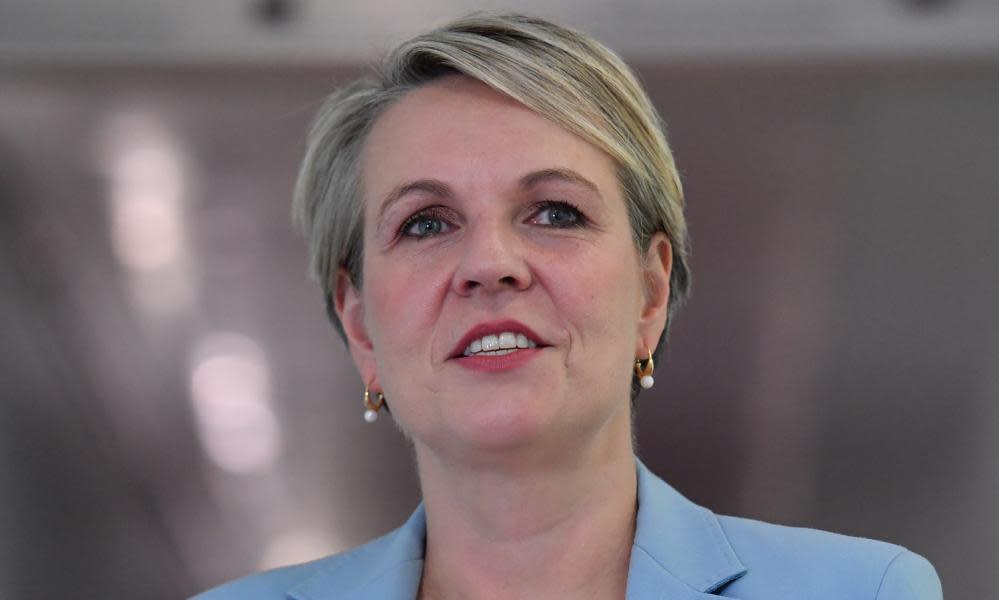Tanya Plibersek declares environment ‘is back front and centre’ in Australia at UN ocean conference

Australia’s new environment minister, Tanya Plibersek, has received an enthusiastic welcome in Lisbon at the UN ocean conference after flagging five new blue carbon projects and declaring that “under the new Australian government, the environment is back – front and centre”.
Plibersek opened her contribution at the conference by telling delegates: “For those of you who don’t follow Australian politics very closely, we’ve just had an election, there’s a new government, the whole world has changed.”
Rousing applause followed. She responded to the affirmation by noting: “It seems that some of you do follow Australian politics – thank you.”
The session’s host, Kristian Teleki, who is global director of the ocean program at the World Resources Institute and head of the friends of ocean action for the World Economic Forum, noted there had been “an incredible amount of progress in such a short amount of time” and said: “Welcome back, Australia.”
Related: ‘Devastating’: Australian politicians respond to US supreme court’s decision on abortion rights
Australia’s position on climate change and broader environmental issues, including oceans, was criticised regularly internationally during the past 10 years because the Coalition was seen by many friends and allies as a laggard.
Plibersek said the Albanese government would unveil five new blue carbon projects this week which are understood to include assistance for developing nations to safeguard the health of their oceans.
“These projects will restore mangroves, salt marshes and seagrasses across our nation,” the environment minister said in Lisbon. “They will help increase carbon sequestration, marine diversity and mitigate flooding.”
Plibersek told the conference Australia’s view was there was no prospect of safeguarding the environment and oceans without focused action on climate change. “Ambition is our only option,” the minister said.
She told delegates Australia had already updated its medium-term emissions reduction target with the UN. With the new parliament opening in a month, Plibersek said bringing forward legislation giving effect to the 43% target would be “one of our first acts as a new government”.
As well as increasing climate ambition, Plibersek said Labor intended to double the number of Indigenous rangers by the end of the decade and learn from traditional methods of caring for land and sea country.
“For more than 65,000 years, Australia’s Indigenous people have cared for land and sea country – ‘country’ being so much more than its physical properties,” Plibersek said. “There is much Australia, and the world, can learn from their example.”
Australia would also be active in the Pacific to support blue carbon projects and share the latest blue carbon science and accounting, she said.
The ocean conference is co-hosted by the governments of Kenya and Portugal. The contribution came as part of a joint declaration on the creation of a global coalition for blue carbon. In a separate session about ocean plastics, Plibersek committed Australia to signing up to the new plastics economy global commitment before the end of 2022.
In an interview with Guardian Australia before she departed for Lisbon, Plibersek said she wanted Australia, which has one of the world’s largest marine parks areas, to take a global leadership role in ocean protection. The Great Barrier Reef has suffered four mass coral bleaching events since 2016 and scientists say 99% of coral reefs are likely to be lost if average heating reaches 2C above pre-industrial levels.
Related: Blue carbon: how three Australian marine sites lock away 2bn tonnes of CO2
Last week the Australian Conservation Foundation launched a legal bid to halt a $16bn gas development in Western Australia, arguing that the effect of its greenhouse gas emissions on the Great Barrier Reef would be significant and should be assessed under national environment law.
The legal action is an attempt to force Plibersek to assess the project under the Environment Protection and Biodiversity Conservation Act rather than the offshore energy regulator, the National Offshore Petroleum Safety and Environmental Management Authority.
The latest major assessment by the Intergovernmental Panel on Climate Change included a section headed: “The Great Barrier Reef is in crisis”. It said the world’s largest coral reef was already heavily affected by climate change, particularly ocean heating, which was leading to more frequent and severe bleaching.
But officials serving the then Morrison government suggested during a meeting about the wording of a report summary that it should say the reef was “not yet in crisis” and “coral reefs are under increasing pressure, but targeted measures and management could reduce risk”.
The Morrison government also successfully lobbied against UN scientific advice that the reef should be placed on a list of world heritage sites in danger.
Australia was given a second affirmation during the ocean conference, with the maritime specialist and French diplomat Olivier Poivre d’Arvor noting: “Thanks to the new prime minister Anthony Albanese and his minister for the environment Tanya Plibersek, the Franco-Australian friendship is back.” Albanese will meet the French president, Emmanuel Macron, in Paris later this week.

 Yahoo Movies
Yahoo Movies 
